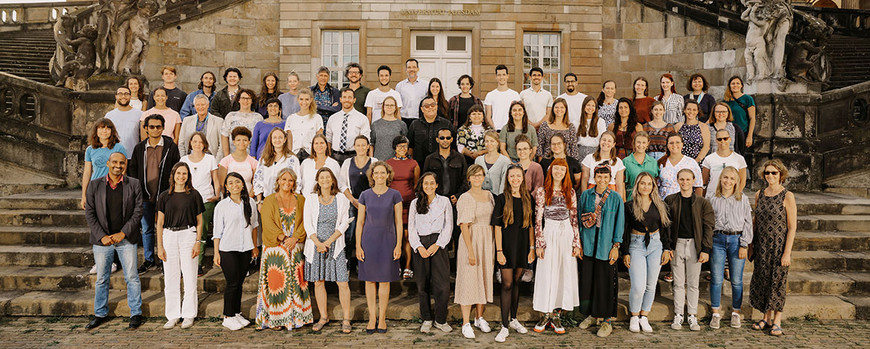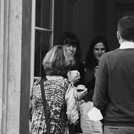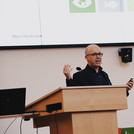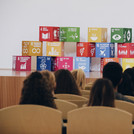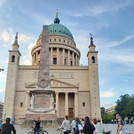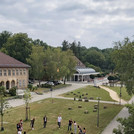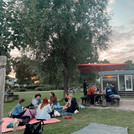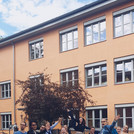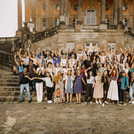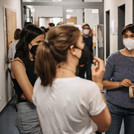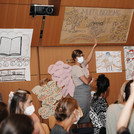Unterwegs in Potsdam
Summer School: “Teaching the UN Sustainable Development Goals: Education for Sustainable Development and Global Citizenship”
How can the UN Sustainable Development Goals be taught and integrated into schools and classrooms? What knowledge, attitudes and skills do learners need to act as responsible glob-al citizens? How can teachers empower the younger generation to participate actively in shaping inclusive and sustainable societies and futures? And what role do different subjects and the school community play as a whole? These questions and many more were the focus of a one week international summer school initiated by University of Potsdam‘s Center for Teacher Education and Educational Research. The summer school participants included 54 student teachers coming from nine different countries sent by international partner institu-tions who are all project partners within the DAAD-funded project “UP Network for Sustaina-ble Teacher Education“. These travel journal entries provide an insight into the participants‘ impressions during the summer school:
Monday, August 29th
Starting on Monday, the first day of the summer school, we hit the ground running with an agenda rife with exciting events for the students. At nine o'clock in the morning, all participants and guests arrived at the Neues Palais Campus and received their goodie bags. Afterwards, the welcome ceremony, as well as the introductory session, took place at the Audimax. After a half-hour break, during which time the guests were provided with coffee, other drinks and snacks, Prof. Marco Rieckmann gave his lecture, which was intended to serve as an introduction to the topic of the SDGs in schools.
Students and lecturers then transferred to the nearby Golm Campus, where they were able to enjoy their lunch break at leisure at the cafeteria before meeting up as study groups for the very first time. At half past three, Pia Erben led a short tour of the Golm Campus, which ended at the train station. Participants had the chance to return to their hotels before ending the day with one of three possible city tours of Potsdam:
1. The Postcolonial Potsdam Tour
2. The Walking Tour of Potsdam
3. The Potsdam Bike Tour
„The day we all waited for! We were finally able to see each other without screens parting us. It was great to get to know each other on a more personal level. The summer school started by meeting everyone in the Audimax at the Neues Palais. We received welcome gifts and listened to speeches and warm welcom-ing words. The reusable coffee mugs turned out to be a great (and sustainable) and much used gift for the upcoming week. In our study group we started by reintroducing ourselves and talked about challenges, questions and further reading regarding our work on the modules that we want to share. As our study group was divided into three groups we had the possibility to exchange ideas about the upcoming presen-tation on Friday.“
Tabea Faber, University of Potsdam (Study Group English/History/Social Sciences)
“After the initial welcome session and the introductory lecture, we got together in our study groups for the very first time! We started with a little getting to know each other before we structured our project and tried to plan all the work we wanted to manage during our time in the study group. After sighting the ma-terials we had again, we also tried to start thinking about the adaptions we had to make, since we were informed, that we will be visited by a class of sixth graders on Thursday to do the project with them. It is a challenge, but I think the whole group is quite excited for the opportunity. […]
I myself took part in the Postcolonial Potsdam Tour, a tour where we walked through Sanssouci and got informed about Postcolonial Potsdam. It was a super interesting tour, of course it was quite some heavy topics we were confronted with, but it was super interesting to listen to a tour from a very different per-spective. Rather than taking part in a 'normal' sightseeing tour, I actually learned a lot of new stuff about the 'sights' in Potsdam, why some of them might be problematic and why we should all think about our own behaviour in society and how we want to approach heavy topics like this.”
Sophie Lehnert, University of Potsdam (Study Group Chemistry/English)
Tuesday, August 30th
Today we continued our agenda with a lot of excitement for students and lecturers alike. At 9:15 a.m., everyone met in their study groups to continue working on their individual projects. After a short re-freshment in the half-hour coffee break, another 90 minutes of collaboration followed in the study groups. At 12:30 p.m., the lunch break ensued, which many were longing for at this point, to recharge our batteries. After that, a very intensive workshop entitled "Futures Expeditions" took place, which focused on projects dealing with sustainability. Afterwards, the participants got a chance to develop such projects themselves in groups. The day came to a relaxing end at the Potsdam Volkspark, were there was a cozy picnic with good music and delicious food.
“It's History Time! Gigi, Caitlin and Taylor made clear, that teaching History is not about stating what happened in the past, it is rather about how the past shapes our present and future. Certain images and perceptions are ingrained in a society, kids hear and repeat phrases, stories or prejudices from their par-ents, which have to be challenged or at least talked about in the classroom.
A memorable exercise that emphasised this, was the following: We should all think of a miner in the Old West, imagine how he looked and draw or write it down. Afterwards we expressed the look and Gigi draw an old man, hunchbacked, with dirty clothes, a hat and a covered mouth, just as miners were shown in old western films about the gold rush. Gigi challenged our images afterwards by showing us the biography of Lieutenant Henry Ossian Flipper (1856 - 1940), who was born into slavery and " became the first African American to graduate from the US Military Academy in 1877 – despite much harassment and isolation […]. This exercise showed precisely how important representation in history and in society in general is, as representations and stories shape our perceptions of reality. […]
As a European, who doesn't have a lot of contact with Americans and American History other than the news reports, it was really interesting to hear of the stories and things that are happening in America eve-ry day and how society deals with it.“
Kathrin Lehnen, University of Potsdam (Study Group English/History/Social Sciences)
“We started by splitting our study group into three parts - each part started working on their task for the CLIL lesson on Thursday. One group took care of the introductory part, the second group worked on the worksheets and the last group did the conclusion and ending part. That was the first of the two days we got to work on it and it did take the whole day as well. But we managed it well.
There was a workshop on future thinking in the context of the SDGs after lunch. […] In the evening there was a picnic at Volkspark. It was very exciting to speak with people from different cultures about our dif-ferent school systems. The food was amazing. The atmosphere was great as well. The groupings from the start were cracked up over time, so everyone got to talk to everyone else. It certainly was an evening where each and every one could find something to enjoy.”
Christina Aldag, University of Potsdam (Study Group Chemistry/English)
Wednesday, August 31st
On Wednesday, the students were given the morning to discuss, reflect and work on various topics in their study groups. The ensuing coffee break not only served to loosen up the intensive working sessions, but also allowed participants to exchange their experiences and get to know each other better. After grabbing a delicious veggie burger in the cafeteria during the lunch break, the participants divided into three workshops:
1. The Sound of Sustainability
2. Developing cultural self-awareness and trans/intercultural sensitivity
3. The Identity Project as a way of engaging in culturally diverse classrooms
In the evening the students had off. Many participants of the different study groups came together and ate, drank and exchanged ideas in a relaxed atmosphere.
„Today we worked on our worksheets and the presentations for our CLIL-lesson Water4future with a 6th grade on Thursday. After our lunch break we attended all a different workshop […] The workshops were interesting and made us aware of topics we didn't think about/ deal with before (for example our own culture identity or the sounds that surround our everyday life).”
Marie Neumeyer, University of Potsdam (Study Group Chemistry/English)
„We started out today with presenting initiatives or organisations which are implementing on or more SDG’s. In small groups we discussed how they help create a more sustainable world, what they are lacking still and how that could be improved. It was a great way to learn about different kinds of initia-tives/organisations and provided specific examples of important values, structures and practices concern-ing the SDG’s in music education. […] In the afternoon we had the chance to participate in different work-shops. […]
The rest of the day we had some free time. […] I first went to the hotel to freshen up, after which we went to the park with a group of students to check out some monuments. Afterwards we went to eat something and met up with other students (from the music study group as well as students from other groups) to have a drink together. The perfect way to end this third day of the summer school and to get to know each other better.“
Tim Collin, LUCA School of Arts (Study Group Music)
„Today we firstly discussed how the depictions of migrants and refugees influence our perceptions. More-over, we debated what guiding principles should be and what suitable resources there are. Secondly, we looked for the role of stories and what criteria for the selection of picture books/stories there are. Lastly, we discussed challenging aspects. […]
I participated in the Identity Project (as a way of engaging in culturally diverse classrooms) and in the Cul-ture workshop („Developing cultural self-awareness and trans/intercultural sensitivity“). The Identity Pro-ject has shown that children who have explored their own identity during an 8-week project are overall happier and perform better. The culture workshop provided a basic introduction into what culture is and gave really intriguing examples on how cultural misunderstandings can take place (and how they can be avoided). Finally, I was really grateful that the two piano teacher students, Petra Ruth Alexandry and Ped-ro Baquedano, were willing to do an interview with me for my podcast ‘Art in Progress’.”
Alexandra Billand, University of Potsdam (Study Group English/History/Social Sciences)
Thursday, September 1st
Thursday offered a lot of time for the students to focus on the upcoming presentations on Friday, to get ideas together, paint posters, create power points and formulate concepts and goals. The chemistry group had an important task ahead of them, because on Thursday they had to put into practice what they had created together in theory the days prior. The group was visited by 26 sixth-graders, who partic-ipated with interest and motivation in the lessons designed by the Chemistry/English Study Group. In the afternoon, all of the summer school participants transferred to the Neues Palais Campus, where, after a photo session in which all study groups received their snapshot, the "Better World Award" took place. The award was given to a thesis that dealt with a better future and presented possible solutions for a better world. Afterwards, snacks and drinks provided a nice atmosphere in which many students ended the evening.
“Today was the most important day of our group - we were finally able to teach our bilingual lesson about the chemistry experiment “Water4Future”. The lessons took place in the rooms and laboratories of the chemistry didactics. We hosted a class of 6th graders with 26 pupils. The first phase of the lesson consist-ed of an introduction and theoretical input. The language was alternated between English and German, depending on the phase of the lesson. […] Then, the lab phase started where the chemistry students led the three experiments and supervised them together with the English students. The pupils worked with the worksheets, designed almost entirely in English, and did an experiment, the purification of water using the self-made activated carbon, all by themselves. During the last phase, the pupils returned to the seminar room, where thy discussed the worksheets in plenary and learned further theoretical basics. After a small round of feedback, the lesson ended. […] In the end the lesson was an intensive, but a nice journey into a bilingual teaching practice with the help of the SDG's.”
In the afternoon, the “Better World Awards” took place, where theses around the topic of sustainability are honored and promoted. We were allowed to attend this event as guests. It was exciting to hear which topics address sustainability and with which complexity they were filled. Some topics were completely unknown for me, so I was amazed that these topics have such a strong connection to the areas of sustain-ability and even the SDG’s. It was also beautiful to see how motivated the nominees were regarding their topics. […] after the award, delicious food was provided for us. There we ate together with some students in a cozy atmosphere and enjoyed the evening together.”
Maria Makuschkin, University of Potsdam (Study Group Chemistry/English)
„Howard delivered a lecture to the students about the relationship between identity and language. In the presentation, students were engaged in thought of their own language and identity. The study groups broke up and identified factors that fit into four main categories; Cul-ture/Identity/Communication/Language. The study groups then took a lunchbreak, after which, they worked together to continue to brainstorm for the upcoming final presentations.“
Darren Heigel, SUNY Cortland (Study Group English/History/Social Sciences)
„We started our Thursday morning with a musical intermezzo that Sarah led. The mixture of song and game activated our brains and body and incited laughter also. We then started working in groups thinking about ways how schools on the one hand, and music school teachers on the other hand, can make classes more inclusive.
Afterwards Dr. Marina Gall held a lecture on “Disability and Music Making” in which she presented a few research projects of hers relating to music education with disabled children and adolescents. […] Following this, we discussed the relationship of music and the climate with Prof. Adri de Vugt. First, we brainstormed in pairs how these two topics are related. Then, we talked about how music and the music industry (con-certs, festivals, streaming,…) (negatively) influences the climate and global warming.
In the afternoon, we divided our music study group into smaller groups to brainstorm ideas for our presen-tation, before sharing our thoughts with the whole group. Interestingly enough, we soon realized that the small groups collected very similar ideas, even though we had not discussed anything beforehand. In the plenum, ideas were compiled and we soon agreed on the basic structure of the presentation. We left the afternoon session with food for thought about the presentation planning that was to be continued on Friday morning.“
Antonia Länger, University of Music and Performing Arts (Study Group Music)
Friday, September 2nd
The last day of the summer school was approaching, and it certainly came at a surprising pace for all participants. The study groups used the remaining time in the morning to make the last preparations for the mutual presentations in the afternoon. After lunch, everyone gathered outside in front of building 6 to listen to the Music Study Group, which chose a "soundscape" for its presentation, using a variety of in-struments and sounds to create a natural spectacle. This was followed by the Chemistry Study Group, which reported on its experiences in the preparation, conception and implementation of the lesson, the English/History/Social Sciences Study Group, which divided into two smaller groups and illustrated con-cepts of identity, individuality and culture, and the Multilingualism Study Group, which created a virtual reality space in which one could move between a diverse range of cultures. A small private concert by Jorge Estupiñán Ordóñez and the joint visualization of an ideal SDG school of the future concluded the summer school. After final greetings, warm hugs and a few selfie mementos, some of the participants made their way to Berlin to take part in the last program point of the summer school: a city tour. Many thanks to all the participants of this project for an inspiring week full of sustainable ideas and sustainable discourse for a more sustainable world.
„The main focus of our work today was the preparation of the upcoming presentation this afternoon. We tried to put together the main results of our discussions and workshops during the week in a comprehen-sive manner and combined them with the experiences we got while conducting our lesson yesterday. Breaking down everything we did for the proved to be an interesting challenge!
After the lunch break, all students came together together to give presentation about the work they did in the individual study groups. The groups put a lot of work into them and produced inspiring results! For me the presentations of the music study group and the English/history/Social studies study group stood out the most - for their interesting approach to show their results and the interactive design respectively.”
Tom Fielitz, University of Potsdam (Study Group Chemistry/English)
„After talking about the organization of the day, we immediately came up with the 3 different parts of the presentation: 1. environmental soundscape on the playground 2. showing posters and material about values, structures, resources and practices related to the SDGs and 3. soundpainting with comments about SDGs related to music and music education. […]
Eventually, we had our lunch break and immediately after that, the presentations started. We were the first group to present and we lead all the other members from the playground (where we performed our soundscape), through the corridors and stairs (where they could see what we had prepared on the walls) to the main room (where we performed our soundpainting and talked about SDGs in music and music education). […]
To conclude the summer school there was a closing plenary session where we had to discuss with mem-bers of other groups how it would be an ideal SDGs school for us.
Then it was already time to say goodbye to some of the members of the group and the rest headed back to the hotel to meet at 18:00 at the front door and start our journey to Berlin. There we met with a Tour guide and she showed us around the city center of Berlin. After ending the tour, we took some pictures at the Brandenburg Gate and had our last dinner together.”
Pedro Jesús Baquedano Lobera, Royal Conservatoire The Hague (Study Group Music)
“As long as we have waited for the Summer School to begin, the week flew by as quickly. The last day had arrived. […] On Friday we used the time to finish our work and worked on the last small details. We were glad to spend some last coffee breaks and a lunch break together with our American fellows.
After the lunch break, we were excited to see what the other groups had been working on during the week. The presentations by the Music and the Chemistry & English study groups impressed us a lot. The third presentation slot was planned for our study groups that was divided into two smaller groups. Both of our groups were satisfied with their products in the end and we enjoyed the participation of the other groups. To round up the presentations, the multilingual group gave an insight into their work. All our study group members definitely enjoyed the presentations and the final day but still it has to be said that the week had been quite exhausting for all of us.
I am glad that we had such a wonderful week with a lot of inspiring conversation. For my part I have to say that I am looking forward for more international exchanges in the future. I would like to end with say-ing thank you to everyone who made the Summer School possible and allowed us to have such a special week at our university.”
Annalena Latendorf, University of Potsdam (Study Group English/History/Social Sciences)
“After a whole week full of encouraging conversation, engaging topics, and new connections, our 2022 summer school about teaching the SDGs has come to an end. We started the morning with one last ses-sion in our small study groups where we were able to finalize our presentations. The history and English study group decided to work in two different groups – one recapping the past week and one presenting a method to teach diversity and equality in the classroom. While working on our projects we realized how excited we were to see what the other study groups had been working on.
Our wish shall be granted after our final lunch/coffee break. We were advised to meet in front of the build-ing to first watch the music group’s presentation. Everyone not belonging to the music study group was told to take a seat on the floor and to close their eyes. What we were now able to experience was an amazing start to the final presentations. The music study group really paid tribute to their passion and took us on a musical adventure through the possibilities of sustainability and equality.
The second slot was filled by the Chemistry and English study group. The members of this group have developed and tested a bilingual Chemistry lesson on the topic of clean water. It was very interesting to follow them along their thought process and to see the results in a real-life classroom setting.
Our study group, the English and History study group, decided to split the rest of the summer school par-ticipants into two groups which were each following one of the History and English study groups to expe-rience our projects. Both of our groups were fairly satisfied with the results and the given feedback from other summer school participants.
Last but most certainly not least we were guided through the virtual reality created by the multilingual study group. They created virtual spaces, including music, traditions, and languages, to honor each and every home nation of their study group members.
Overall, it was amazing to connect with all the different people from all around the world and to have some exchange between the different study groups as well. We all developed engaging projects and con-tributed to a very special experience for each and every one of us.“
Marie Schuchardt, University of Potsdam (Study Group English/History/Social Sciences)

